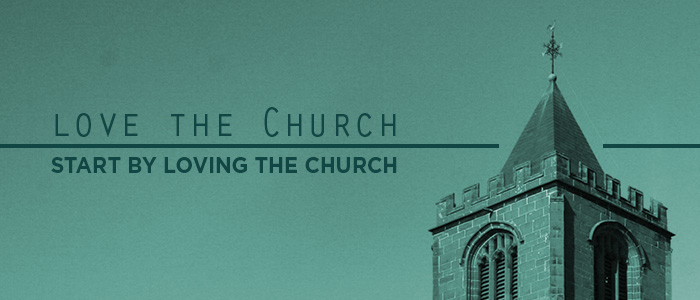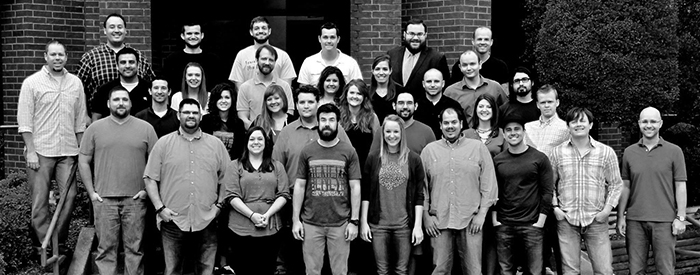 The Young, Restless, & Reformed Complementarian crowd is often caricatured by a flannel shirt wearing bearded young man who gulps craft beers and talks theology from scribbled notes off his moleskine notebook. He quotes Piper and Packer and Paul. He opens doors for his sisters and uses the word "damn" with frequency, except when his simple fundamentalist Baptist mother is around. He never feels completely capable of leading anyone because he feels like he's playing catch-up for all his years of not. He drinks his coffee black.
The Young, Restless, & Reformed Complementarian crowd is often caricatured by a flannel shirt wearing bearded young man who gulps craft beers and talks theology from scribbled notes off his moleskine notebook. He quotes Piper and Packer and Paul. He opens doors for his sisters and uses the word "damn" with frequency, except when his simple fundamentalist Baptist mother is around. He never feels completely capable of leading anyone because he feels like he's playing catch-up for all his years of not. He drinks his coffee black.
Because the movement has historically been so stalwartly male, made of all things growly and gruff, there just hasn't been a similar caricature for the female side of YRRC. Though if you were going to attempt a one, she's probably an avid Pinner, crafting the perfect home for her bearded [future] husband, reading Proverbs 31 and feeling like she falls short of everything except being a wife of noble character (and only because the YRR guy wouldn't choose anything less than nobility of character for his wife). She probably shops at Whole Foods, or for the more frugal, Trader Joes. She writes Bible verses on index cards and tacks them to kitchen cabinets.
. . . . . . . . . . . . . . . . . .
One of the enemy's favorite tactics is to take what God has not called ultimate and make it so. If he can confuse the Christians, get them to devour one another, well, he can call it a day. No need for the Crusades part deux, Jesus came to bring a sword, and by golly, the first people we're gonna use it on is one another.
One particular area of glee the enemy is basking in these days is the division he's bringing to the Church concerning gender roles. And he does it by making caricatures rampant.
Humanity is important, which means individuals are important, which means men and women are important, which means what men and women do is important, and if the enemy can make what we do (or have done) more important than what God has done, he will seem to have won this particular battle.
. . . . . . . . . . . . . . . . . .
A concern of mine I see as I stand on the sidelines, and am being invited into the midst, is that we are taking caricatures of men and women and making them ultimate. For the YRR complementarian man, he thinks a principal way of Being A Man is fighting for his sisters: he wants them to be protected and flourishing—only he's a little clumsy at it sometimes and it can come off like he's being a chauvinist. For the complementarian woman, it's to find a husband as quickly as possible—not because she's half a person without him, but because how can she prove she's a distinct helper if she's not helping anyone? For the egalitarian man, he wants to serve his sisters by fighting to give them a voice where traditionally the most a woman can do in the Church is change diapers and hand out bulletins (Note: both tasks are valuable, I'm not knocking them, just how they limit the abundantly distinct gifts of women.). For the egalitarian woman, she has distinct powerful words burgeoning up inside of her and wants desperately to share them with the world; she wants to help, even if she ends up just sounding shrill.
Theologically we're not at all alike, but practically I think we are.
I don't think we all are. But I think we are sort of kind of maybe are.
. . . . . . . . . . . . . . . . . .
Hear me out.
If the enemy's favorite tactic is to distract us by what is not best, so we would miss what is, wouldn't you say he thinks he's succeeding in some respects (Gen. 3.1-5)?
We have brothers who are fighting on behalf of their sisters, wanting to see their strengths utilized and maximized within the bounds of scripture, and we have sisters who want to do what they were created to do: help bring wisdom, counsel, a distinct voice, a feminine voice.
We're not so different after all.
But if we continue to get distracted by terminology, practicality, and sustainability, we're going to lose sight of the beautiful simplicity of the Gospel. I am not saying a theology of gender roles is unimportant here—I'm saying the world and its constructs are dead to us, we boast in the cross alone (Gal. 6.14).
Piper said, "We're not here to make men and women, we're here to make disciples." And my heart leaps inside of me when I hear that. Practice is important, but our practice should be to make disciples in the shadow of the cross, not to make mini-mes. "Come and die" is our mantra, "it's gonna hurt" should be our caveat.
. . . . . . . . . . . . . . . . . .
Are you trying to fit yourself into a caricature of what your church or your theology deems you to be? Can I plead with you to not? You are doing a disservice to your theology, your brothers and sisters, and most of all the Gospel, if you make your position or personality ultimate.
Brothers, help your sisters. Fight for them when they are being marginalized. Fight for them not because you want them to lead you, or because you think it will make you more capable of leading them, but because the more you fight for your sisters, the more they will fight for you, and the more you will contend for the Gospel together as one.
Sisters, fight for your brothers. Help them see things in different distinct ways, help them with gentler tones and aspects of humanity that have been characterized as feminine. There is a deep need in the Church today for strong gentleness, ferocious lovingkindness, and articulate passion, and you are absolutely built to bring it to the table. But bring it for the sake of the Gospel, not your voice.
"Jesus is tough and tender, absolutely will get in the face of wicked, self-righteous leaders, and then hug a child. So when we come to Christ, men get appropriately tougher and appropriately more tender, and the same thing happens with women. It's like the last chapter, the end of a movie. There's a sense that my life makes sense, my experiences make sense. I am a female, but it's a bigger deal than that, I am a part of a greater story, I have a sense that I'm bringing to the table not just my femininity, but my spiritual gifts. I am not just a man, but I'm here to give my life away for the body of Christ. And that only happens when we come to Christ." —Darrin Patrick
For the sake of the gospel, friends, be like Christ. Tough and tender, both for both, all at once, all one in Jesus Christ.














